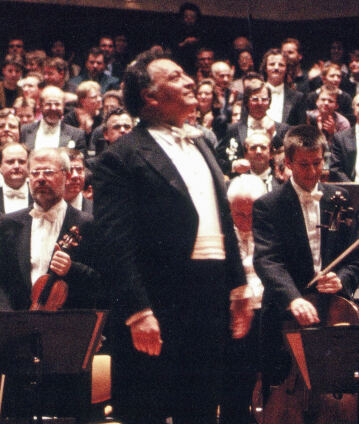Zubin Mehta conducts Stravinsky’s “Le Sacre du printemps”

With the utmost precision and unbridled vitality, Zubin Mehta conducts Igor Stravinsky’s Le Sacre du printemps. To this day, the ballet music, which caused a furore at its premiere, has lost none of its thrilling effect. The concert opens with Mozart’s evocative Serenade in B flat major, K. 361, in which he demonstrated his sensitivity in the use of wind instruments.
Igor Stravinsky’s Le Sacre du printemps is a legend of musical Modernism – a masterpiece of the century that set new directions in music history with its irrepressible rhythmic energy. The premiere in 1913 at the Théâtre des Champs-Élysées in Paris, choreographed by Vaslav Nijinski, was probably the greatest succès de scandale in music history: according to police reports, the spectacle, which ended in chaos, caused no fewer than 27 injuries.
The exotic bassoon solo in its highest register at the beginning is enough to make the listener sit up and take notice. The rhythms that Stravinsky then uses in overlapping patterns to embody the pagan rite of spring in the ballet narrative are harsh and often violent. “The Sacre”, says Pierre Boulez, “serves as a pivotal point in any attempt to fix the beginnings of New Music”. Ballet music had never been so wild, so excessive or so overtly erotic.
When Zubin Mehta, regular guest and later honorary member of the Berliner Philharmoniker, conducted the Sacre in April 1993, it became clear once again what makes his concerts so special: through accuracy in the rhythm and an emotional shaping of the music, his performances are immensely vivid. It is these qualities of Mehta’s conducting that make him one of the Berliner Philharmoniker’s closest partners.
A special liveliness also characterises Mehta’s reading of Mozart’s Gran Partita, scored for two oboes, clarinets, bassoons and basset horns, four horns and double bass. It is hard to imagine that music as delicate as that of the Adagio, in which individual wind instruments perform cantilenas over gentle pulsations, would have been heard in Mozart’s day as an accompaniment to open-air events. In the shielded acoustics of the Philharmonie Berlin, Mehta and the Philharmoniker succeed in bringing out all nuances of this sophisticated work.
© 1993 TV Man Union
Artists
Our recommendations
- Zubin Mehta conducts Bruckner and Messiaen
- Zubin Mehta conducts “Otello”
- Benefit Concert of the Federal President of Germany with Zubin Mehta and Pinchas Zukerman
- Anniversary concert with Zubin Mehta and Mahler’s First Symphony
- Zubin Mehta conducts Mahler’s Third Symphony
- Zubin Mehta conducts Mahler’s Third Symphony